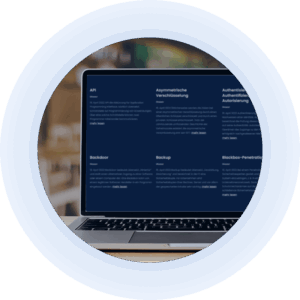![]() Anonymisers
Anonymisers

Anonymizer sind Programme, die bei der Nutzung des Internets Ihre Identität verbergen.
Verkürzt gesagt basiert jede Aktion im Internet auf Datenaustausch. Rufen Sie eine Seite auf, fragen Sie Daten an. Sehen Sie die Seite, wurden Ihnen diese Daten gesendet. Dazu muss bekannt sein, wohin diese Daten gesendet werden müssen. Diese Information ist bereits automatisch in Ihrer Anfrage, dem Aufruf einer Seite enthalten. So entstehen bei jeder Aktion Datenspuren, die sich zu Ihnen zurückverfolgen lassen.
Anonymizer unterbrechen diese Datenspur. Sie leiten den Datenaustausch über einen oder mehrere zwischengeschaltete Server um. Dieser Server ruft nun für Sie die gewünschte Seite auf, die entsprechenden Daten werden an ihn gesendet. Die Datenspur ist also nur zu diesem Server zurückverfolgbar – vorausgesetzt der gewählte Anonymizer ist vertrauenswürdig.
Es gibt Anonymizier in Form von Software und als Onlinedienste.
Aber: Daten und Anfragen bekannter Online-Anonymizer werden von vielen Websites nicht akzeptiert. Denn häufig werden Anonymizer genutzt, um negative, beleidigende oder sogar kriminelle Einträge in Foren, Gästebüchern, Bewertungsportalen usw. vorzunehmen.
Für Journalisten und Menschenrechtsaktivisten können Anonymizer sehr wichtig sein, um sich und Mitarbeiter vor Verfolgung zu schützen. Aus dieser Motivation nutzen sie z. T. auch das Darknet, dessen Datenverkehr nicht zurückverfolgt werden kann. Kriminelle nutzen Anonymizer, um einer Strafverfolgung zu entgehen.
Vermutlich begegnen Ihnen Anonymizer eher selten. Möglicherweise verbreiten Nutzer, die Ihre Identität per Anonymizer verschleiern, negative Inhalte über Ihr Unternehmen – z. B. schlechte Bewertungen oder sogar Lügen bezüglich Ihrer Produkte, Dienstleistungen oder Arbeitgeberqualitäten. Die Nutzung von Anonymizern kann ratsam sein, wenn der Verdacht besteht, dass Ihr Unternehmen gezielt ausgespäht wird, etwa im Rahmen eines Advanced Persistent Threats. In diesem Fall gehen Sie nach Absprache mit Ihrer IT-Abteilung und ggf. mit einem externen IT-Sicherheitsdienstleister wie Perseus vor.
Wägen Sie die Verwendung von Anonymizern immer wieder neu ab: Einerseits vermeiden Sie bei der Nutzung von Anonymizern Datenspuren, die sich bis zu Ihnen zurückzuverfolgen lassen. Andererseits vertrauen Sie diese Datenspuren letztlich dem jeweiligen Anoymizer an. In den meisten Fällen müssen Sie darauf vertrauen, dass der Anonymizer Ihre Daten tatsächlich anonymisiert und dass sein System nicht durch Schadsoftware korrumpiert ist. Eine Alternative zu Anoymizern kann ein VPN sein, ein Virtuelles Privates Netzwerk. Inzwischen bieten viele Antiviren Programme eine solche Funktion an.
Anonymisers are programmes that hide your identity when you use the Internet.
In short, every action on the Internet is based on data exchange. When you visit a website, you request data. When you see the page, this data has been sent to you. To do this, the destination of the data must be known. This information is already automatically included in your request when you visit a page. This means that every action leaves data traces that can be traced back to you.
Anonymisers interrupt this data trail. They redirect the data exchange via one or more intermediate servers. This server then calls up the desired page for you and the relevant data is sent to it. The data trail can therefore only be traced back to this server – provided that the anonymiser you have chosen is trustworthy.
Anonymisers are available in the form of software and online services.
However, data and requests from known online anonymisers are not accepted by many websites. This is because anonymisers are often used to post negative, offensive or even criminal comments in forums, guest books, review portals, etc.
Anonymisers can be very important for journalists and human rights activists to protect themselves and their employees from persecution. For this reason, some of them also use the darknet, whose data traffic cannot be traced. Criminals use anonymisers to evade prosecution.
You are unlikely to encounter anonymisers very often. Users who conceal their identity using anonymisers may spread negative content about your company, such as poor reviews or even lies about your products, services or employer qualities. The use of anonymisers may be advisable if you suspect that your company is being deliberately spied on, for example as part of an advanced persistent threat. In this case, consult with your IT department and, if necessary, an external IT security service provider such as Perseus.
Always weigh up the use of anonymisers carefully: on the one hand, using anonymisers prevents data traces that can be traced back to you. On the other hand, you ultimately entrust these data traces to the respective anonymiser. In most cases, you have to trust that the anonymiser actually anonymises your data and that its system has not been corrupted by malware. An alternative to anonymisers can be a VPN, a virtual private network. Many antivirus programmes now offer this feature.